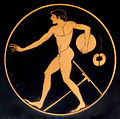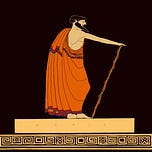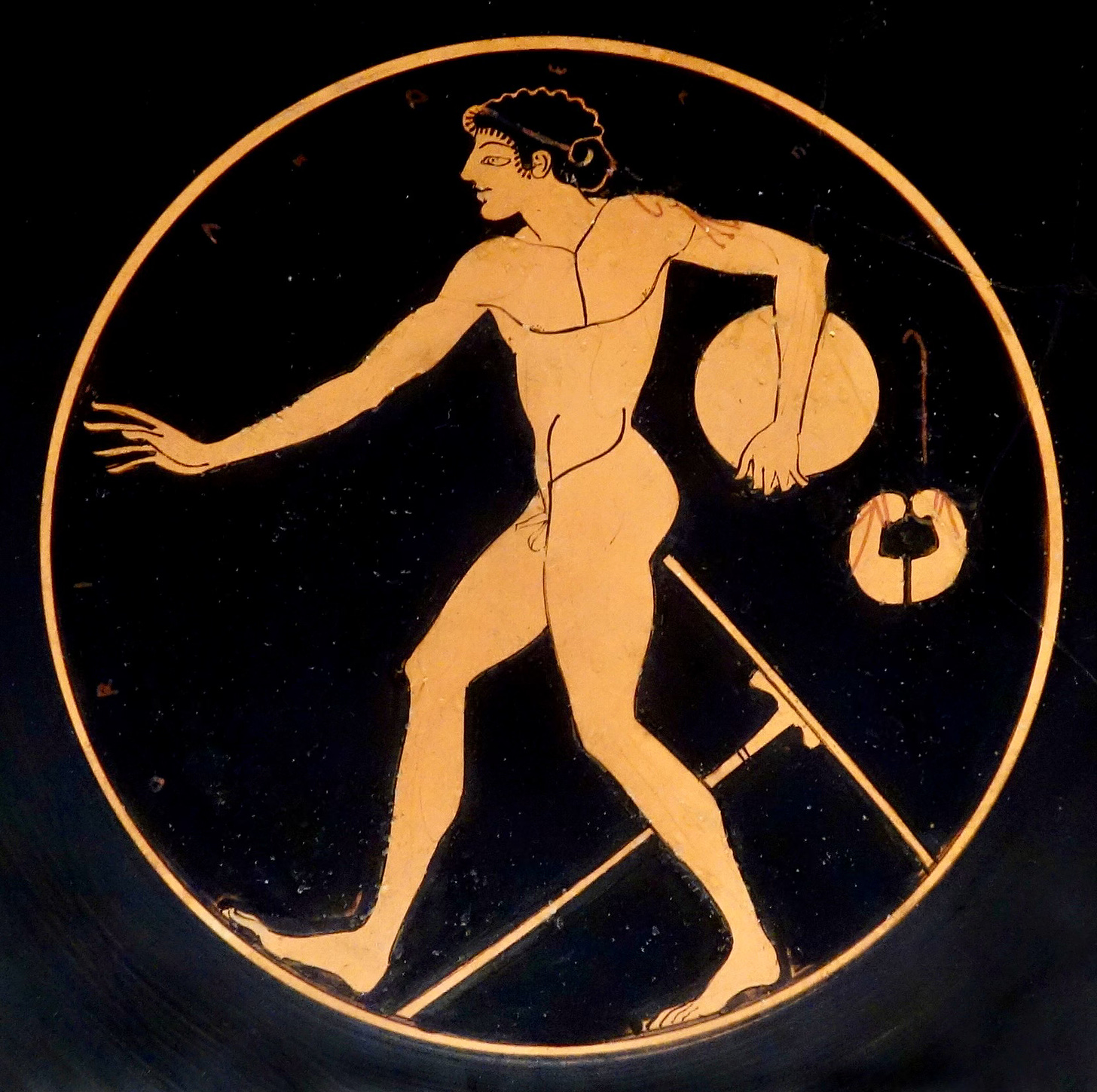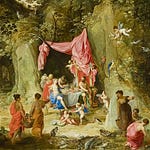Odyssey 4.625-741
Noemon’s charming cameo in Odyssey 4, when he walks in among the suitors who are throwing the discus and hurling javelins, was my first clue that it was okay to laugh at what was being said and what was going on. The notion that this poem of Homer’s is an ‘epic’ can create obstacles to registering a number of modes that seem very dear to this storyteller, from irony to wistfulness to downright satire. To be sure, the hexameter’s rhythms, inflections, and ethos are a constant and omnipresent enchantment, which do indeed create a modus or state of mind which deserves a name; and ‘epic’ will do. The Iliad everywhere demonstrates the power of this rhythmic consciousness in depicting war and its wounds, physical or otherwise, achieving a measure of distance from its protagonists and their expressed experience which can only be called sublime. But the Iliad also reminds us in the Catalogue of Ships that this rhythm most originally was the vehicle and setting for memorial lists, like genealogies, danced out in a space that conjured the names of the past to the present. In other words, the epic rhythm was something that proved adaptable to singing such a song as the Iliad; it was not necessarily born for such tragic sublimity. In light of this, I would suggest that comedy also both represents and induces a distinctly felt state of mind, one which profoundly affects one’s registration of words, people, and events. One can laugh at certain things in comedy, for example, which it would be impossible, or insufferable, to laugh at in tragic circumstances. One fellow’s trip-up is another’s calamity. The only argument against the idea that the epic rhythm cannot be adapted to comedy, is perhaps the fact that the Odyssey does not generally register in this way, as a comedy—whether in the ancient world or the modern. All the same, one does not want to be one of those people who are not in on the joke; that’s a very awkward place to be. My own experience teaches me to try to help people get in on it, even if they’re classical scholars, rather than snub them because they don’t ‘get it’, as one is often tempted to do; because for me the Odyssey came extraordinarily to life when I realised I was sitting at a comedy, rather than an ‘epic’. It is very important to know, in ways that are hard to define—before one sits down in one’s seat—that one has come to see a comedy, and not a tragedy or a horror show. Are the suitors comic villains, or truly evil ones? Would their deaths count in the same way, one way or the other?
When I began this substack I would post Samuel Butler’s translation of the Odyssey with my Greek recitations; it is readily available in the public domain. He rendered Homer into English prose—and so do I—but that both is and is not the reason for his translation’s greatness. On the one hand, prose does rather break the spell of epic rhythm and music. That can seem a deficit; in my case at least I have kept to Homer’s lines and as much as possible his word order, so you get his lines treated as semantically timed units, if you will, albeit not rhythmic ones. But what Butler captures also is the prosaic quality of what is being said: and this is a revelation. Butler opened my eyes to the fact that comedy was happening, all around. But translation is not decoding. Other prose translations do not achieve what Butler’s does, for all that they also sidestep the hexameter rhythm and ambience. Most feel they must strike a reverential, King James posture if they’re going to sound epic in prose. The comic modus, however, requires a peculiar sympathy between poet and audience, and poet and translator. Butler translating the Odyssey is someone who seems like he’s speaking to us from the other side, where Homer is, distilling his author’s verses and versified speeches back into their original, deadpan, Victorian prose.
That it is Butler’s sympathy for Homer’s own comic disposition, in the texture and subtext of the Odyssey—rather than his skill at decoding the words—which leads to his translation’s insight, is evidenced by Butler’s translation of the Iliad. Clearly Butler’s philological acumen is everywhere the same. But his translation of the Iliad has never seemed anything special to me. There is not the same sympathetic resonance with the ethos of that work.
Noemon is a comic superstar. He comes out of nowhere, asking for his boat back, the one he had lent to Athena in disguise as Telemachus. Noemon (‘Minder’) has been having mules bred across the water, and he wants to fetch one and break him in. So he sidles up to to the mean suitor Antinous (‘Counter-Mind’) and asks after his ship. And so Telemachus’ game is up. But the real nod and wink here is Noemon’s amazement at having seen Mentor locally yesterday morning; because he’d already gone on board ship with Telemachus, as the captain! That, of course, had been Athena playing Mentor. The joke is one for the solo performer to ham up, because it’s he who has been playing all these people, including Athena becoming Mentor. Mentor in particular, I would suggest, is the performer’s special stand-in to break the fourth wall with the audience. You see, Mentor, who will keep turning up, including in the last line of the whole poem, is [wink wink] the performer’s alter ego. That’s the joke when Noemon says the man he saw yesterday was either “Mentor or a god—he looked the very same man in every way.” That’s a limitation of a solo actor playing all the parts: he’s only got one face and body. Wink wink.
‘In sooth I know not why I am so sad.’ Sadness is no stranger to comedy. The constant crying and wailing among the men already, to which Odysseus will make a plentiful contribution, and which Helen resorts to drugging them to curtail, certainly seems a bit funny. But in women’s tears I think we find a refuge of seriousness which comedy protects. Penelope gets the best poetry, and that is the mark of a heroine. That she could not even sit on a chair, for all that the house had plenty round, and that she sat on her bedroom’s wooden threshold, is an image speaks a thousand words. She is guarded about Odysseus: no ‘personal’ feelings are disclosed, only the outward fact that he was a man and a husband with a tremendous reputation. But when it comes to her son, she bursts out in a way captured by Homer’s art, which has arranged her words to utter three straight circumflexes: νῦν αὖ παῖδ’ ἀγαπητὸν ἀνηρείψαντο θύελλαι / ἀκλέα ἐκ μεγάρων, οὐδ’ ὁρμηθέντος ἄκουσα. “But again now, my son, beloved—they’ve snatched him up, the storm winds, / An unknown out of these rooms, and I didn’t even hear of his setting off.” Rhythm usually arises from the alternation of stressed and unstressed beats. Here we have three straight emphases, three full Greek contonations, like Lear’s four cries, “Howl, howl, howl, howl!” This utterance of three straight circumflexes turns out to be a motif of Penelope’s. The genuineness of her feeling is scripted in the score, as is the bitterness at her apparent betrayal at the hands of her servants, who had kept her in the dark about Telemachus’ adventure.
The Odyssey captures an aching sadness, it seems to me. It is a kind of feeling wholly absent in tragedy, but which seems very much at home in Shakespeare’s comedy, a kind of undertow to the fun that is only hinted at in the notion of ‘melancholy’. Intimations of paradise are full of heartbreak. Am I wrong, or is it unhelpful somehow, to connect this sadness to comedy?
In Greek:













Noemon!: Homer in English